I recommend trying a mix of traditional and digital feedback tools to gather valuable insights for your business. Suggestion cards, open house forms, and suggestion box cards work well for in-person feedback, while NFC contactless cards and online survey platforms like Typeform make it easy to collect digital responses. Each option offers unique benefits, but choosing the right mix depends on your needs. Keep exploring to discover how these tools can help you improve and grow.
Key Takeaways
- Top survey tools like Typeform and Google Forms offer customizable, interactive, and easy-to-analyze customer feedback collection options.
- Digital tools with integration capabilities, such as Zapier and Mailchimp, streamline data management and automate workflows.
- Physical feedback devices like suggestion cards and NFC reviews enhance in-person engagement and quick response collection.
- Industry-specific tools cater to hospitality, real estate, retail, and service sectors, improving targeted feedback gathering.
- User-friendly interfaces, real-time analytics, and affordable pricing are key factors to choosing effective feedback survey tools.
50 Suggestion Cards for Customers and Guests (Kraft Style Feedback Forms)
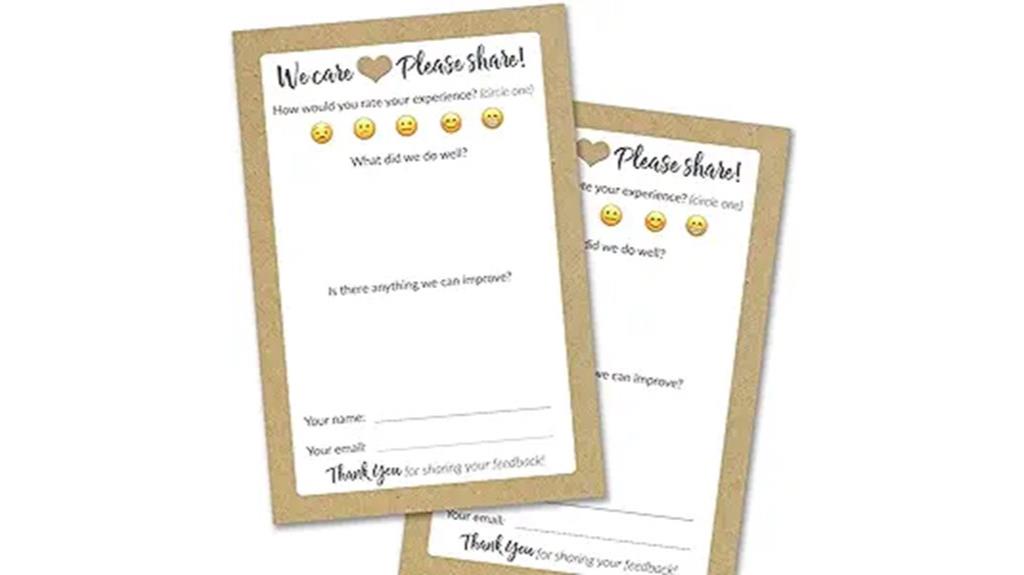
If you’re looking for an easy and professional way to gather customer feedback, suggestion cards like the Kraft-style feedback forms are an excellent choice. I’ve used these sturdy, 4×6” cards made from premium cardstock that’s both stylish and durable. Customers appreciate their quality, often commenting on how easy they are to fill out and how they leave a positive impression. Whether in restaurants, B&Bs, or service businesses, these cards facilitate quick, direct communication. They make guests feel valued and help gather valuable insights effortlessly. Plus, their professional look shows you care about quality and attentiveness, boosting customer satisfaction.
Best For: small business owners, hospitality providers, and community organizers seeking an easy, professional way to collect customer or guest feedback.
Pros:
- Made from premium, durable 4×6” cardstock that is sturdy and long-lasting.
- Stylish, professional design that enhances brand image and leaves a positive impression.
- Facilitates quick and straightforward feedback collection, encouraging more responses.
Cons:
- Limited space on each card may restrict detailed feedback.
- Bulk pack may be more than some small businesses need at one time.
- The cards are only available in brown and white, which may not match all branding styles.
Suggestion Cards for Customer Feedback (50 Pack)
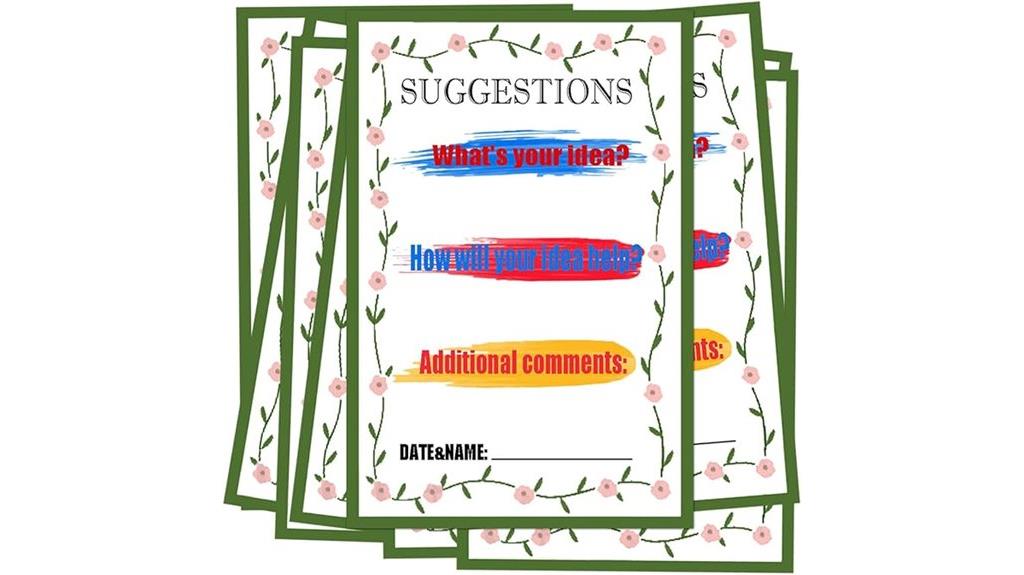
Suggestion Cards for Customer Feedback (50 Pack) are an excellent choice for small businesses, restaurants, salons, and offices seeking to streamline communication. I appreciate their compact 4×6-inch size and smooth paper, making it easy for customers and staff to write their comments, suggestions, or complaints quickly. The trendy, professional design encourages open feedback and shows that you care about input. These sturdy cards are versatile, suitable for capturing feedback from guests, suppliers, or employees. Using these cards demonstrates attentiveness and professionalism, helping to improve customer satisfaction and overall service quality. They’re a simple yet effective way to gather valuable insights effortlessly.
Best For: small businesses, restaurants, salons, and offices looking to enhance communication and gather customer or employee feedback efficiently.
Pros:
- Stylish and professional design that encourages open feedback
- Compact 4×6-inch size makes it easy for quick note-taking
- Durable, high-quality paper ensures longevity and ease of use
Cons:
- Limited space on each card may restrict detailed feedback
- May require additional collection and processing methods for large volumes
- Not suitable for digital or remote feedback collection
Digital NFC Card for Customer Feedback (3 Pack)
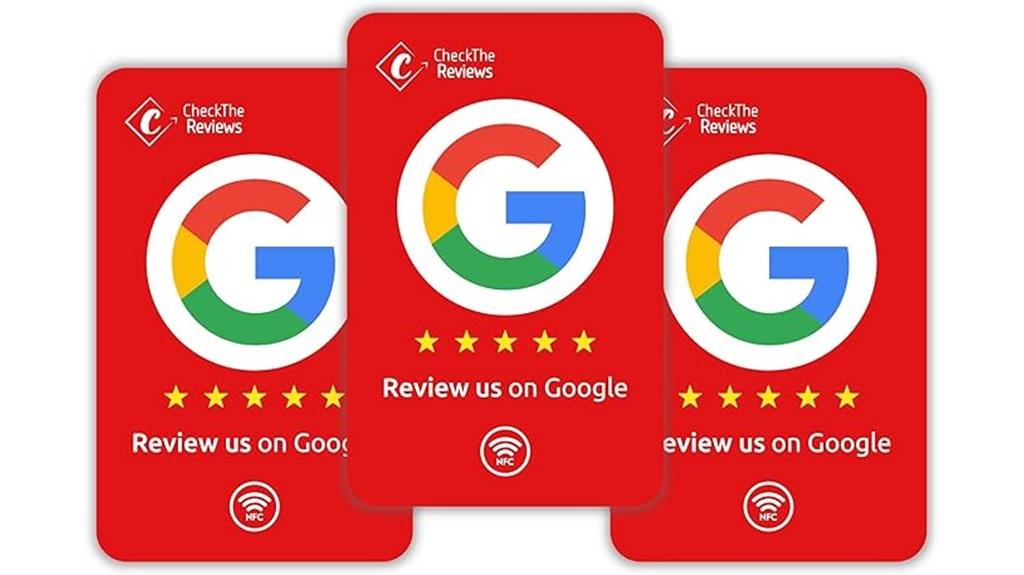
Looking for an easy way to gather customer feedback without complicated setups? The Digital NFC Card for Customer Feedback (3 Pack) makes it simple. Just tap or scan the card to direct customers to your review sites like Google, Facebook, or TripAdvisor. It’s contactless, cost-effective, and requires no subscriptions—unlimited taps at no extra charge. Setup is straightforward with clear instructions, making it perfect for restaurants, salons, or shops. Customers appreciate its convenience, which helps boost reviews and online visibility. Although some find the instructions vague, many users see improved reputation management and engagement. It’s a versatile tool for enhancing your business’s online presence.
Best For: small to medium-sized businesses such as restaurants, salons, shops, cafes, and service providers seeking an easy, contactless way to gather customer reviews and improve online reputation.
Pros:
- Easy to set up with clear instructions, allowing quick activation and use
- Cost-effective with unlimited taps and scans at no additional charge, no subscription needed
- Enhances online visibility and customer engagement by directing customers to review sites like Google, Facebook, and TripAdvisor
Cons:
- Some users report vague or unclear setup instructions, leading to activation difficulties
- Linking the NFC cards to specific business pages can be challenging for some users
- Limited detailed support or troubleshooting guidance may affect less tech-savvy customers
Open House Feedback Forms – Registration Log Book
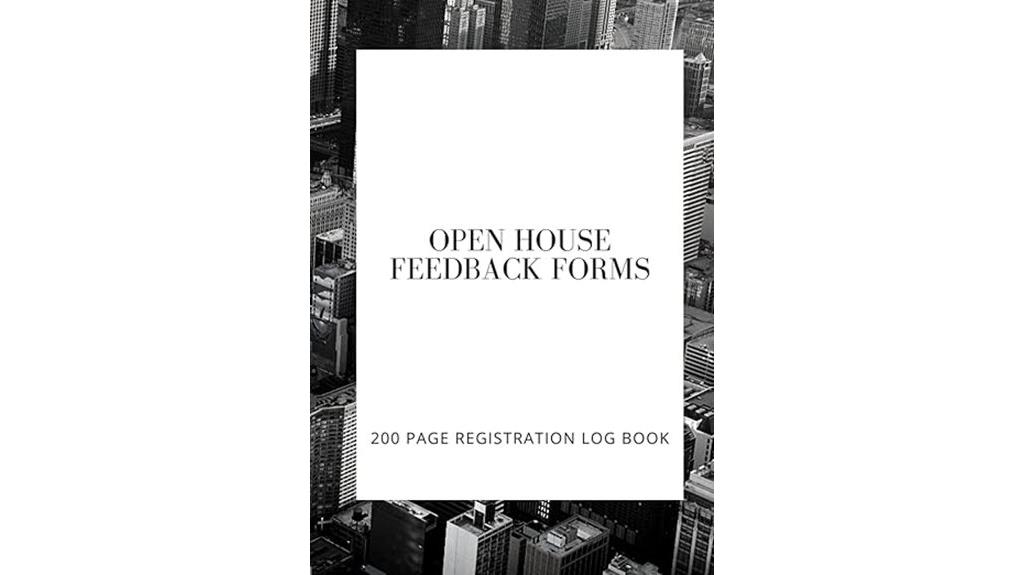
The Open House Feedback Forms – Registration Log Book is an ideal choice for real estate agents and property managers seeking an organized way to gather visitor information and insights during open house events. This 200-page registry book captures essential contact details like name, email, and phone number for follow-up. Visitors rate key property features on a 1-5 scale, covering aspects such as location, curb appeal, and floor plan. The form also includes space for feedback on preferences and suggestions, helping you identify improvements. Its clear layout and instructions guarantee efficient data collection, making it easier to track visitor impressions and enhance your marketing strategies.
Best For: real estate agents and property managers seeking an organized way to collect visitor information and feedback during open house events.
Pros:
- Facilitates comprehensive data collection with contact details and visitor insights
- Includes a detailed rating system for evaluating key property features
- Helps identify visitor preferences and suggestions to improve property appeal
Cons:
- Limited to one visitor per page, which may require multiple pages for large crowds
- Paper-based format may be less efficient compared to digital data collection methods
- Does not include pre-printed labels or quick-entry features for faster processing
Open House Feedback Forms Registration Log Book for Real Estate
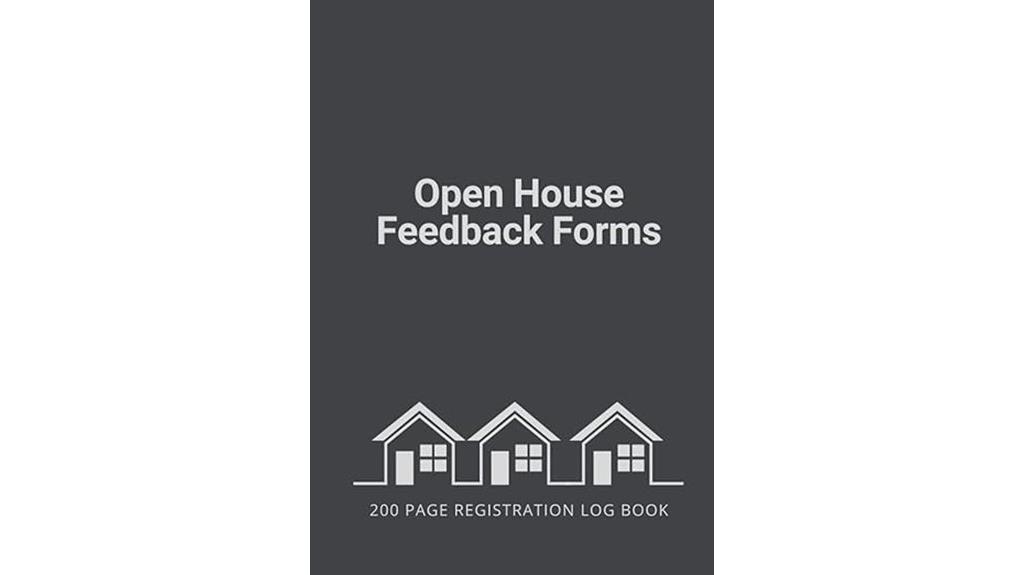
For real estate agents hosting open houses, an organized Feedback Forms Registration Log Book is essential for collecting detailed visitor insights. I use a 200-page log book designed specifically for open house visitors, enabling me to gather contact details like names, emails, and phone numbers efficiently. Each page records one guest’s responses, including property ratings on a 1-5 scale and feedback on features and improvements. The form also captures visitor preferences, such as moving timelines and home-selling plans. This structured approach helps me evaluate visitor interest, identify key property strengths, and tailor my sales strategies effectively. It’s a practical tool for turning visitor insights into actionable sales data.
Best For: real estate agents and brokers seeking an efficient way to collect and analyze visitor feedback during open house events.
Pros:
- Provides a comprehensive, structured format to gather detailed visitor insights.
- Facilitates easy tracking of contact information and property ratings in one place.
- Enhances ability to tailor sales strategies based on visitor preferences and feedback.
Cons:
- The 200-page format may be cumbersome for smaller open house events with fewer visitors.
- Requires manual data entry, which can be time-consuming and prone to errors.
- Limited digital integration, making data analysis less streamlined compared to electronic systems.
Forms and Surveys Building with Typeform
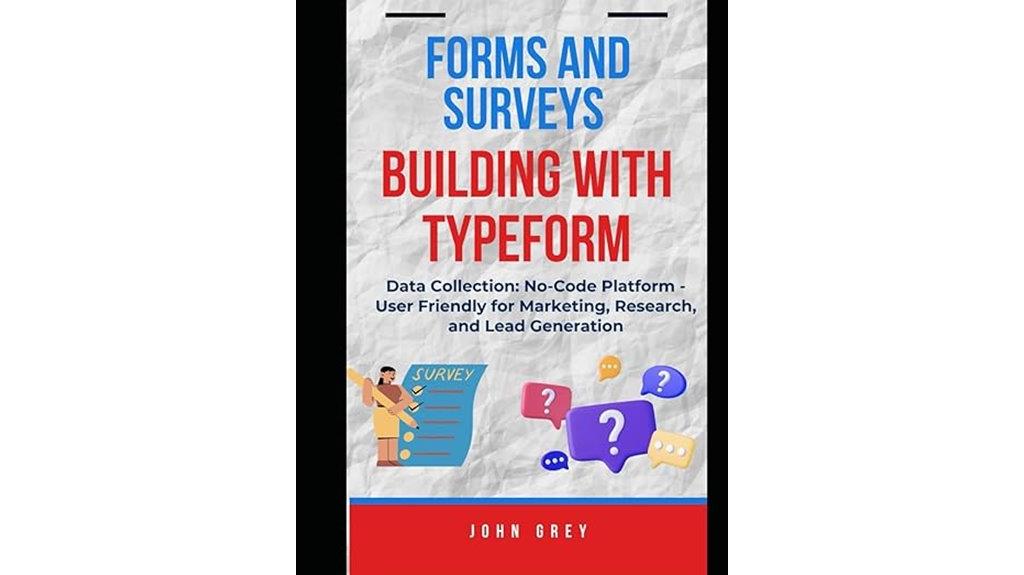
Typeform stands out as an ideal choice for anyone seeking to build engaging, user-friendly forms and surveys that boost response rates. Its conversational interface makes data collection feel natural and less tedious, encouraging more responses. With an intuitive design process, you can create visually appealing forms that incorporate logic jumps, hidden fields, and conditional flows for personalized experiences. Advanced features allow for dynamic question paths, increasing engagement and data accuracy. Plus, Typeform integrates smoothly with tools like Google Sheets, Mailchimp, and Slack, automating workflows and streamlining data management. This combination of usability and powerful functionality makes Typeform a top pick for effective survey building.
Best For: marketers, educators, entrepreneurs, and teams seeking engaging, user-friendly forms and surveys that boost response rates and facilitate seamless data collection.
Pros:
- Creates interactive, conversational interfaces that increase respondent engagement.
- Offers customization with logic jumps, hidden fields, and conditional flows for personalized experiences.
- Integrates easily with tools like Google Sheets, Mailchimp, and Slack to automate workflows.
Cons:
- Advanced features may require a learning curve for new users.
- Costs can escalate with increased responses or premium features.
- Limited offline capabilities, relying heavily on internet connectivity.
FixtureDisplays 25 Suggestion Cards for Continuous Improvement
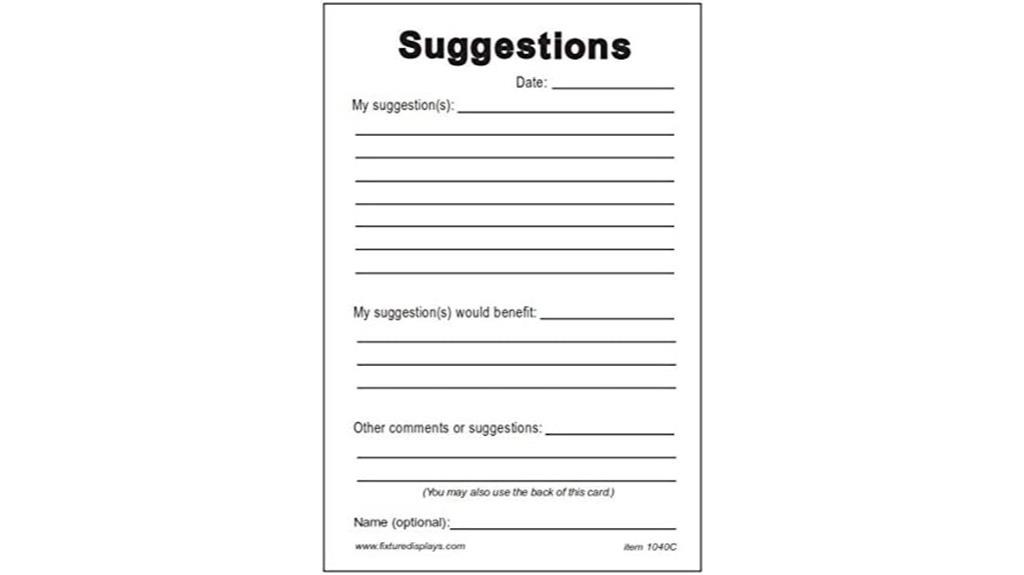
FixtureDisplays’ 25 Suggestion Cards are an excellent choice for organizations seeking a simple, effective way to gather continuous improvement ideas from employees, customers, or suppliers. These 4×6-inch cards are made of durable paper with top-glued bonding for easy attachment, encouraging quick and straightforward feedback submission. With 25 cards per pack, they’re ideal for fostering ongoing suggestions that drive growth. Plus, video instructions make it easy to implement. Whether used in-office or at events, these cards help create a culture of continuous improvement, making it simple for everyone to share their insights and contribute to your organization’s success.
Best For: organizations looking to gather continuous improvement ideas from employees, customers, or suppliers to foster a culture of growth and innovation.
Pros:
- Easy to use with top-glued bonding for quick attachment and submission.
- Compact 4×6-inch size makes them convenient for various settings.
- Includes video instructions to facilitate proper implementation.
Cons:
- Limited to 25 cards per pack, which may require additional orders for large-scale use.
- Made of paper, which may not be as durable as other materials for long-term use.
- Customer rating of 4.0 suggests some users may find better alternatives or experience minor issues.
FixtureDisplays® Suggestion Box Cards (25 Pack, 3.5×8.5, 1040D)
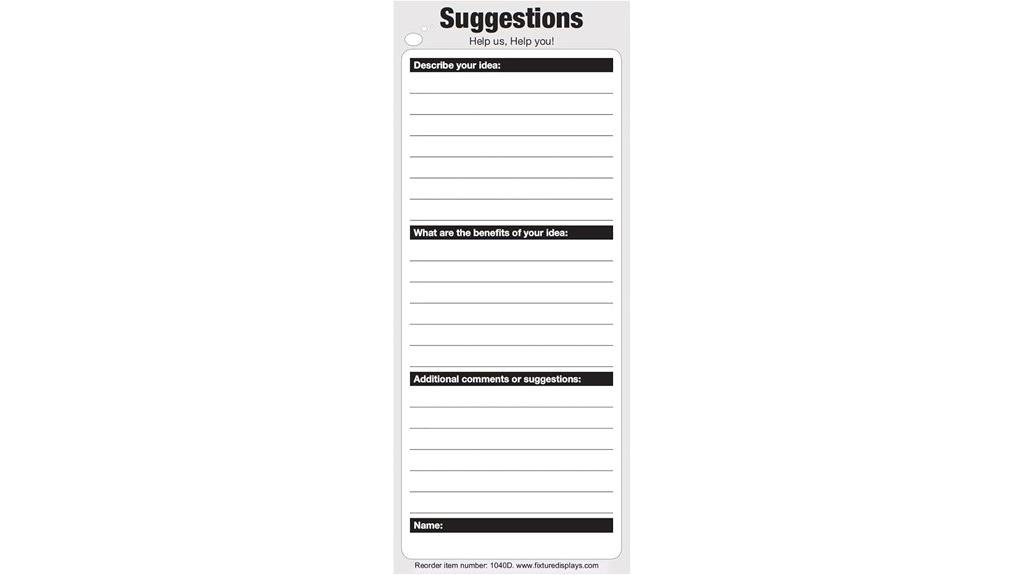
If you’re looking for a durable and professional way to gather feedback from employees, customers, or suppliers, FixtureDisplays® Suggestion Box Cards are an excellent choice. These 25-pack cards measure 3.5 x 8.5 inches and are made from sturdy 60# index bond paper with a clean, white finish. Designed with blue ink and a glue-bonded top, they stand up well to handling in busy environments like restaurants or offices. The ample space on each card encourages detailed suggestions and insights, fostering a culture of continuous improvement. Plus, their professional appearance helps promote constructive feedback and open communication across your organization.
Best For: organizations seeking a durable, professional solution for collecting detailed feedback from employees, customers, or suppliers in busy environments.
Pros:
- Made from sturdy 60# index bond paper ensuring durability during handling
- Professional appearance with blue ink and clean white finish promotes constructive feedback
- Ample space on each card allows for detailed suggestions and insights
Cons:
- Limited to 25 cards per pack, which may require frequent reordering for high-volume environments
- Glue-bonded top may become less effective if not handled carefully over time
- Only available in a standard size (3.5 x 8.5 inches), which may not suit all feedback collection needs
Welcome Open House Registry Guest Book for Realtors
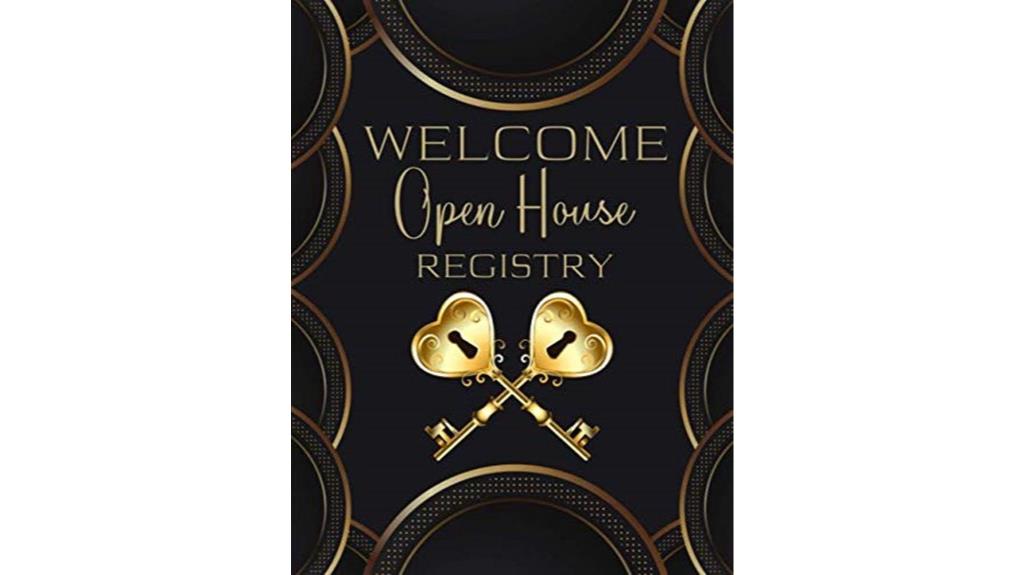
The Welcome Open House Registry Guest Book for Realtors is an essential tool for real estate professionals who want to streamline visitor sign-in and gather extensive prospect information. Its elegant design features a glossy paperback cover and 8.5 x 11-inch size, making it suitable for professional displays. With 120 pages and space for three guests per page, it can capture up to 357 entries. The book prompts visitors for details like contact info, how they heard about the open house, and their buying plans. This all-inclusive data collection helps build valuable prospect lists, enhance client engagement, and support follow-up efforts. It’s an efficient way to improve open house professionalism and grow your business.
Best For: Real estate agents, brokers, and property developers seeking a professional, organized way to record visitor information at open houses.
Pros:
- Elegant glossy cover enhances professional appearance
- Large 8.5 x 11-inch size provides ample space for detailed entries
- Capable of capturing up to 357 guest details for effective follow-up
Cons:
- Limited to 120 pages, which may be insufficient for high-traffic open houses
- Paper format may not suit digital or hybrid open house events
- Requires manual entry, which can be time-consuming during busy events
Survey Savvy: Questionnaires & Market Research for Results
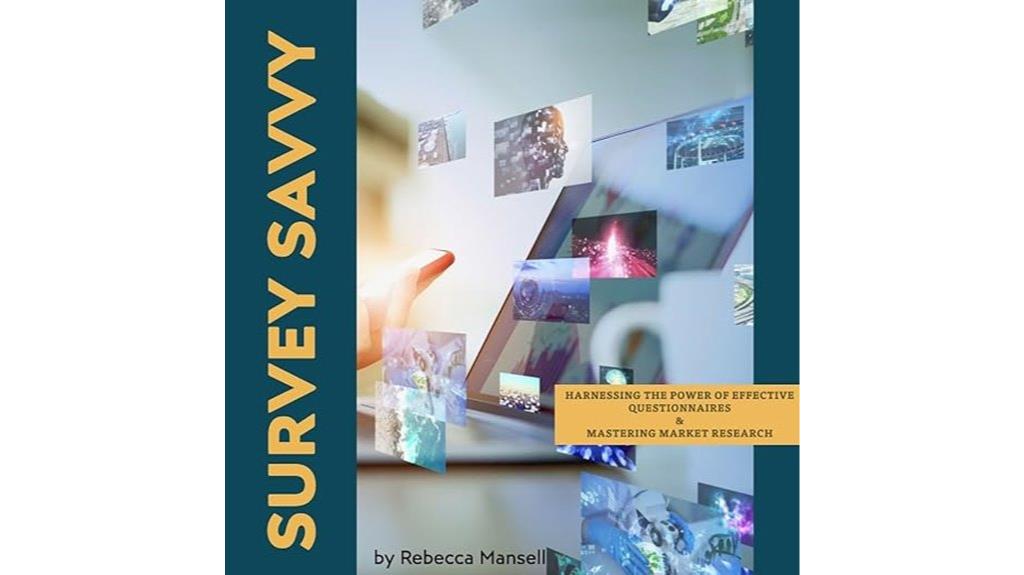
For anyone looking to gather honest, actionable insights from customers or target audiences, Survey Savvy offers powerful tools to design effective questionnaires and conduct meaningful market research. I’ve learned that understanding your audience starts with crafting clear, unbiased questions tailored to your goals. Choosing the right format—online, mobile, or in-person—ensures better response rates. Analyzing data ethically and visually presenting results helps turn raw responses into strategic insights. With practical guidance and a focus on integrity, Survey Savvy makes market research accessible for everyone—no PhD required—empowering smarter decisions and stronger business growth.
Best For: small business owners, entrepreneurs, and marketing professionals seeking accessible, ethical market research tools to design effective surveys and gain actionable insights.
Pros:
- User-friendly platform that requires no advanced research skills
- Emphasizes ethical data collection and privacy protection
- Offers practical guidance with real-world examples for immediate application
Cons:
- Limited advanced analytical features for complex data analysis
- May require additional tools for extensive data visualization needs
- Some features might have a learning curve for complete beginners
How to Create an Effective Advisory Board
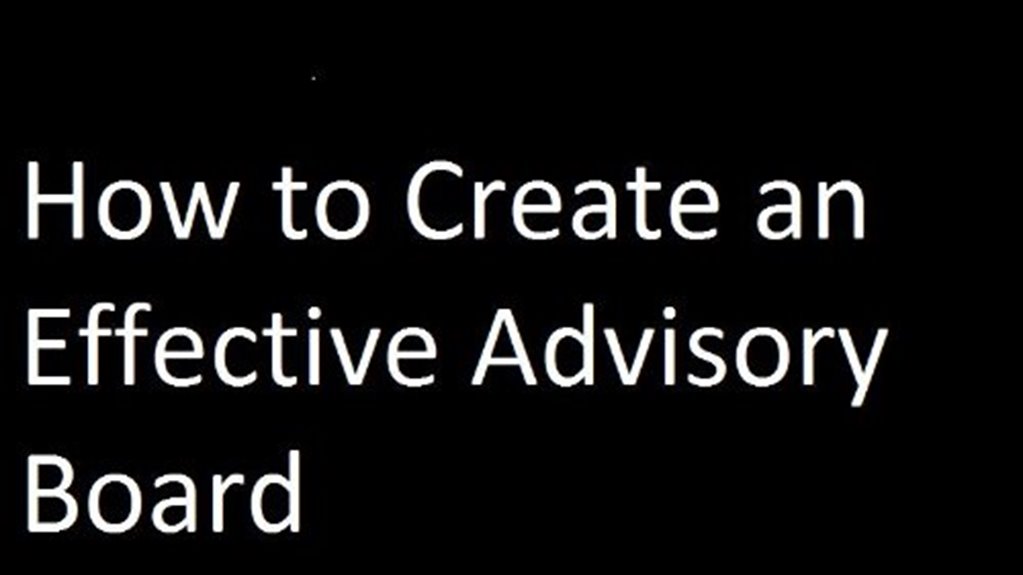
Creating an effective advisory board is essential for small business owners seeking strategic guidance and industry expertise. I recommend clearly defining its purpose to align member contributions with your goals. Start by recruiting members with diverse skills and experience, and use checklists to streamline the process. Formalize relationships with templates and agreements that specify roles, confidentiality, and expectations. Hold initial meetings to set objectives and foster open communication. Regularly evaluate the board’s effectiveness with worksheets and feedback. By following these steps, you’ll build a trusted advisory group that offers valuable insights, helps you make informed decisions, and drives your business forward confidently.
Best For: small business owners seeking strategic guidance, industry expertise, and credibility to make informed decisions and grow their business effectively.
Pros:
- Provides valuable strategic insights and industry expertise to guide business growth.
- Enhances credibility and professional reputation with a formal advisory structure.
- Facilitates informed decision-making through diverse member perspectives.
Cons:
- Requires time and effort to recruit, organize, and manage advisory board activities.
- Potential conflicts or misaligned expectations among members if roles are not clearly defined.
- Legal and operational considerations may involve additional costs and administrative work.
Open House Registry: Real Estate Sign-In Guest Book for Agents and Realtors
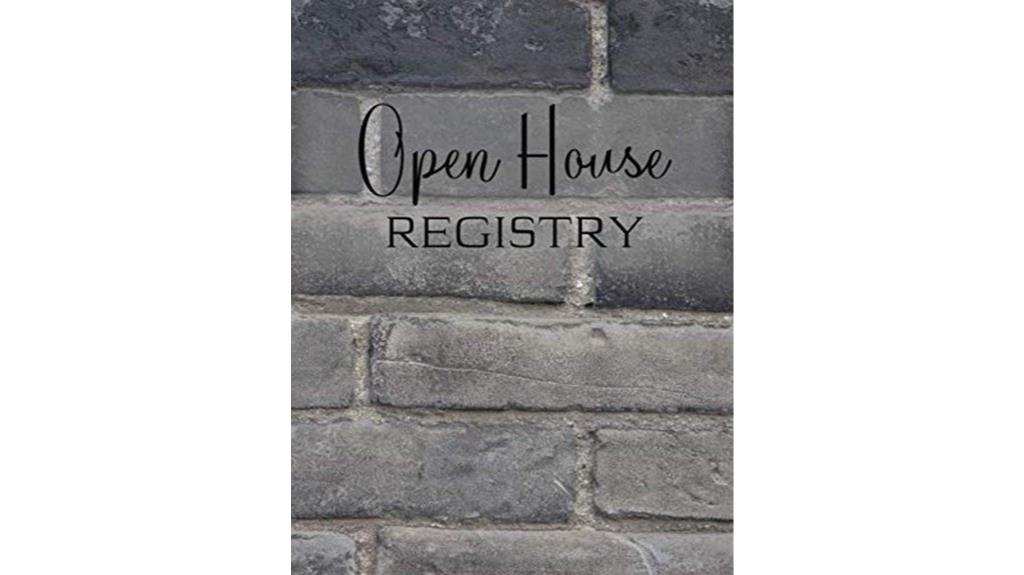
Real estate professionals seeking a polished way to track open house visitors will find the Open House Registry book an essential tool. Its elegant gray brick wall cover and matte finish give it a professional appearance. The large 8.5 x 11-inch size and 120 pages provide plenty of space for visitor sign-ins and notes. Each page holds three entries with fields for name, contact details, and additional comments. Visitors can share how they heard about the event, if they’re working with an agent, and other relevant info. This sign-in book streamlines visitor tracking, helps build prospect lists, and enhances your open house presentation.
Best For: real estate agents, brokers, and property developers seeking a professional and organized way to track open house visitors and gather valuable prospect information.
Pros:
- Elegant gray brick wall cover with a matte finish enhances a professional appearance.
- Large 8.5 x 11-inch size with 120 pages provides ample space for detailed visitor sign-ins and notes.
- Layout allows for three entries per page, maximizing capacity and efficiency during busy open houses.
Cons:
- The size may be less portable for agents on the go or with limited storage space.
- Only 120 pages may require frequent replacements for high-traffic open houses.
- The design is primarily suited for professional use, which might not appeal to casual or informal events.
NFC Business Google Review Tap Card, Contactless & Reusable
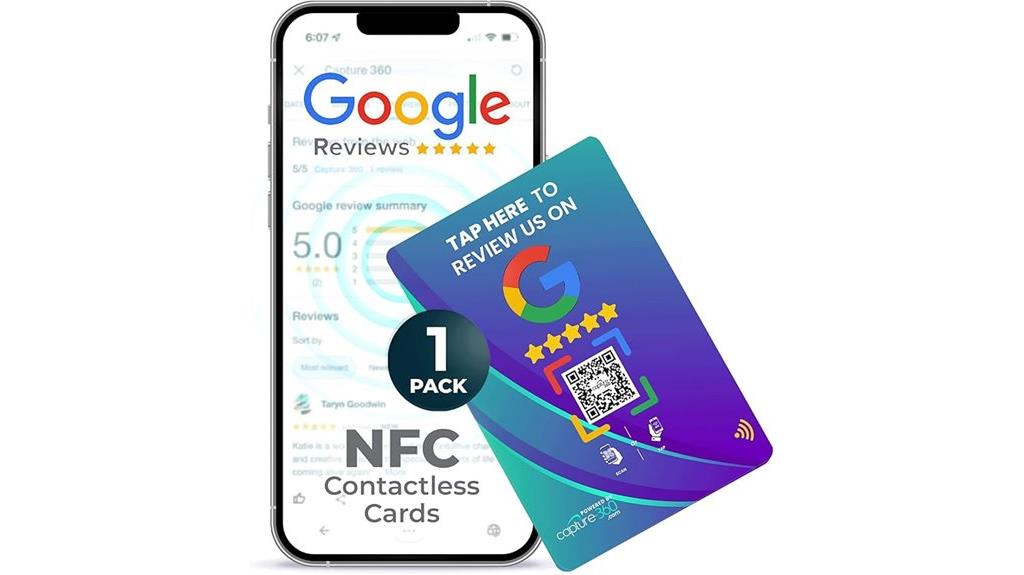
The NFC Business Google Review Tap Card stands out as an ideal choice for small businesses seeking a seamless way to gather customer feedback and enhance their online reputation. It’s a contactless, reusable tool that fits easily into various settings like cafes, salons, or retail shops. With a simple tap, customers can instantly access review pages using any NFC-enabled device, making feedback collection quick and effortless. Setup is straightforward—just tap and register via the app, with no ongoing fees. Many users appreciate its durability and effectiveness at boosting Google reviews, helping businesses improve their online visibility with minimal effort.
Best For: small to medium-sized businesses like cafes, salons, retail shops, and hotels looking to effortlessly collect customer reviews and improve their online presence.
Pros:
- Easy and quick setup with no technical skills required
- Durable, reusable, and compatible with all NFC-enabled devices
- Helps increase Google reviews and enhances online reputation efficiently
Cons:
- Limited to businesses with NFC-enabled devices and customer base
- May require the optional RMS plan for advanced review management features
- Some users might prefer physical or traditional feedback methods alongside digital options
Guitar Luthier Tool Set for Guitar and Bass Setup
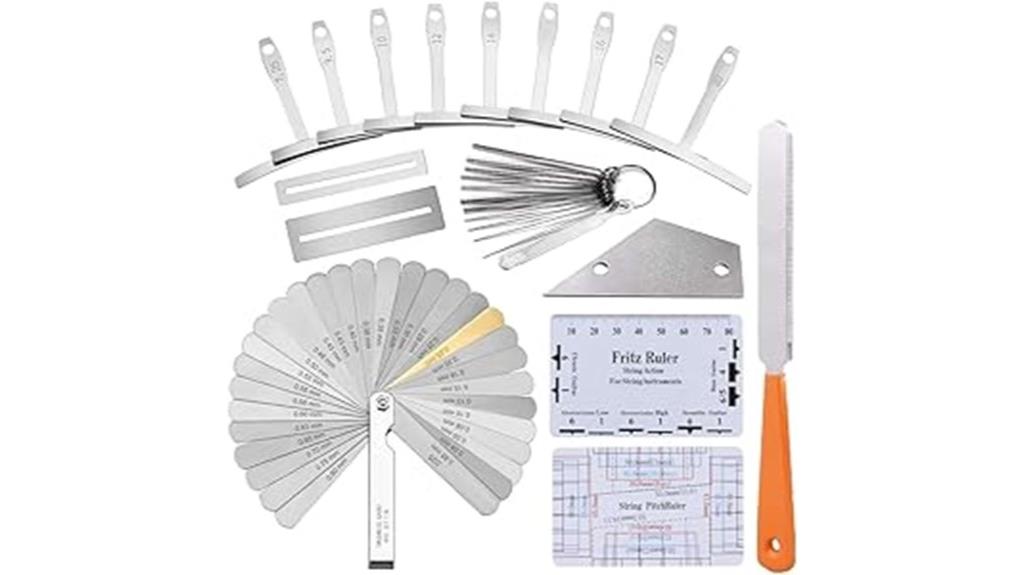
A Guitar Luthier Tool Set is essential for anyone serious about maintaining or customizing their guitar or bass, thanks to its thorough selection of precise, high-quality tools. This complete kit includes a fret crowning file, understring radius gauges, fingerboard guards, a fret rocker, a string action ruler, and feeler gauges—covering all setup and repair needs. Crafted from durable stainless steel with rounded edges, these tools resist rust and deformation, ensuring longevity. They’re compatible with various stringed instruments and facilitate tasks like fret crowning, radius measurement, and string height adjustment. The practical design promotes safety and accuracy, helping you keep your instrument in top condition.
Best For: guitarists, bass players, and luthiers seeking a comprehensive, durable set of professional tools for precise guitar and bass setup and maintenance.
Pros:
- Includes all essential tools for comprehensive guitar and bass setup and repair.
- Made from high-quality stainless steel for durability and resistance to rust.
- Compatible with various stringed instruments and designed for safety and accuracy.
Cons:
- May be too extensive for casual players who only perform basic adjustments.
- Slightly higher price point due to the quality and completeness of the set.
- Requires some familiarity with guitar maintenance techniques to maximize usefulness.
Unlock AI for Product Management
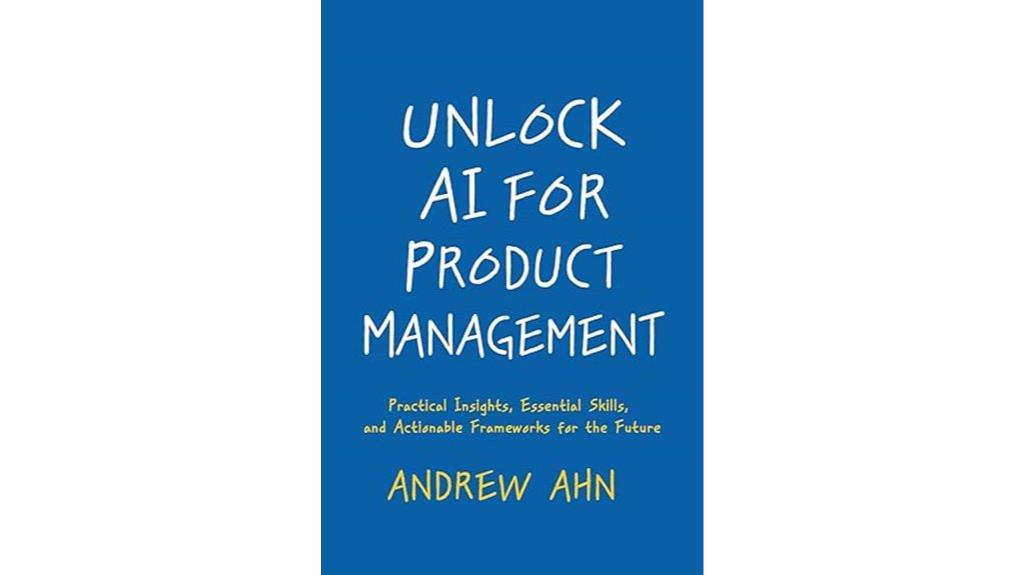
Revealing AI for product management empowers teams to make smarter, faster decisions by integrating intelligent tools directly into their workflows. I’ve seen how AI reduces task execution time, freeing resources for strategic efforts like client engagement and planning. With AI-driven workflows, you can streamline idea development, strategy reviews, and user research. Learning to craft effective ChatGPT prompts or co-create with generative AI enhances innovation. Adopting frameworks like AI-Ready versus AI-First helps align your team’s goals. By responsibly integrating AI, you stay competitive, improve decision-making, and access new opportunities—making product management more efficient and future-proof.
Best For: product managers, entrepreneurs, and consultants seeking practical AI integration strategies to optimize decision-making and streamline workflows in a fast-paced, competitive environment.
Pros:
- Provides actionable frameworks and real-world case studies for effective AI adoption.
- Enhances decision-making speed and accuracy through AI-driven workflows.
- Supports both beginners and experienced users with practical tips on AI tools and prompts.
Cons:
- May require an initial investment of time to learn new AI tools and workflows.
- Risk of over-reliance on AI, potentially reducing critical human oversight.
- Can become quickly outdated as AI technology evolves rapidly.
Factors to Consider When Choosing Customer Feedback Survey Tools

When choosing customer feedback survey tools, I focus on ease of use, integration capabilities, and customization options to guarantee they fit my needs. I also consider data analysis features to make sense of the feedback and cost effectiveness to stay within budget. These factors help me select tools that are efficient, adaptable, and valuable for my business.
Ease of Use
Choosing a customer feedback survey tool that’s easy to use can make a significant difference in gathering valuable insights without frustrating respondents or administrators. A user-friendly interface requires minimal training, making setup straightforward for everyone involved. Intuitive design features like drag-and-drop question builders and pre-made templates help reduce the time spent creating and distributing surveys. Clear instructions and simple navigation boost respondent engagement and increase completion rates. It’s essential that minimal technical skills are needed for setup, customization, and data analysis, so users with varied expertise can operate the tool efficiently. Additionally, quick setup processes and responsive customer support enhance overall usability, ensuring the survey deployment is smooth and hassle-free. Ease of use directly impacts the quality and quantity of feedback collected.
Integration Capabilities
Seamless integration capabilities are crucial when selecting a customer feedback survey tool, as they guarantee your feedback data flows smoothly into your existing systems. A tool that connects effortlessly with your CRM, email marketing platform, or data analysis tools streamlines workflows and minimizes manual data entry errors. Robust options like Zapier or Integromat enable automation, allowing for real-time notifications and customized workflows. Integration with social media and review sites broadens your survey reach, capturing feedback from multiple touchpoints. Additionally, API access and developer support empower you to tailor integrations to your specific operational needs. Choosing a tool with strong integration capabilities ensures your customer insights are efficiently consolidated, helping you make informed decisions faster and more effectively.
Customization Options
Effective customization options empower businesses to create surveys that truly reflect their brand identity and meet specific feedback goals. With advanced features like personalized logic jumps, conditional questions, and dynamic content, surveys become more engaging and relevant, encouraging higher response rates. The ability to incorporate branding elements such as logos, color schemes, and custom fonts guarantees consistency and professionalism, reinforcing brand recognition. Customizable templates allow for quick setup while still being adaptable to different audiences and objectives. Flexibility in customization directly impacts the quality of data collected; well-designed, personalized surveys motivate respondents to provide more meaningful feedback. When choosing a survey tool, prioritize those that offer robust customization options to enhance engagement and gather insightful, actionable responses.
Data Analysis Features
When evaluating customer feedback survey tools, strong data analysis features are essential for transforming raw responses into actionable insights. Effective tools should quickly interpret large volumes of feedback through visualizations like charts and graphs, making trends easy to spot. Advanced analytics, such as sentiment analysis and keyword tracking, help uncover customer feelings and recurring themes within open-ended responses. The ability to filter and segment data allows me to focus on specific customer groups, ensuring insights are relevant and targeted. Automated reporting and real-time dashboards enable ongoing monitoring of satisfaction levels, supporting quick decision-making. Robust data analysis features also facilitate benchmarking and tracking progress over time, helping me refine strategies and foster continuous growth based on customer feedback.
Cost Effectiveness
Evaluating the cost-effectiveness of customer feedback survey tools involves more than just comparing their prices; it requires examining their features and long-term value. I look at subscription fees, one-time costs, and any extra charges for advanced features or integrations. A free trial or tier helps me assess whether the tool delivers value before committing financially. I also consider the ROI—how much it improves response rates and provides actionable insights relative to its cost. Lower-priced tools might save money but often lack features like analytics or customization, which can boost overall value. I weigh the total cost against ease of use, support quality, and how well the tool encourages customer engagement. This exhaustive approach helps me choose a solution that balances affordability with effectiveness.
Mobile Compatibility
Choosing a customer feedback survey tool requires careful attention to mobile compatibility, as more respondents prefer to answer surveys on their smartphones. A responsive design that adapts seamlessly to various screen sizes ensures easy navigation and a smooth experience. Support for mobile-specific features like touch-friendly buttons, dropdowns, and easy-to-read fonts can considerably boost user engagement. I also look for platforms that allow offline data collection, so responses can be submitted without internet access and synced later. Compatibility with major mobile operating systems like iOS and Android broadens reach. Additionally, quick load times and minimal data entry help reduce respondent fatigue. Ensuring these factors are in place increases the likelihood of gathering meaningful insights from your mobile audience.
Response Rate Optimization
Ever wondered what factors can truly boost your customer feedback response rates? One of the most effective strategies is offering incentives or rewards, which can increase participation by up to 50%. Keeping surveys short—ideally under five minutes—reduces respondent fatigue and encourages completion. Clear, specific questions help minimize confusion, leading to more accurate and engaged responses. Personalizing follow-up reminders can also make a big difference, boosting response rates by around 20-30%. Additionally, timing matters—sending surveys immediately after a purchase or interaction captures more relevant feedback and increases the likelihood of responses. By considering these factors when choosing survey tools, you can substantially improve your response rates, gather richer insights, and make better-informed decisions to enhance your business.
Security & Privacy
When selecting customer feedback survey tools, prioritizing security and privacy measures is essential to protect sensitive data and maintain customer trust. Guaranteeing the tool complies with regulations like GDPR and CCPA is crucial to avoid legal issues and safeguard customer information. Encryption of data both in transit and at rest keeps feedback confidential and prevents unauthorized access. Robust authentication methods, such as multi-factor authentication, help verify user identities and restrict access to survey results. Clear privacy policies that explain how data is collected, stored, used, and shared foster transparency and build trust. Additionally, regular security audits and vulnerability assessments of the platform help identify potential risks, ensuring ongoing protection against breaches. Prioritizing these factors ensures your customer data remains secure and your reputation intact.
Frequently Asked Questions
How Do I Integrate Survey Tools With Existing CRM Platforms?
You’re wondering how to integrate survey tools with your CRM platform? I recommend starting by checking if your survey tool offers native integrations or API support. Then, follow the platform-specific steps to connect them—most CRMs have plugins or connectors for popular survey tools. If needed, consult the documentation or support teams. This way, you streamline data collection and keep everything synced for better insights and customer management.
What Security Measures Protect Customer Data Collected Through These Tools?
When it comes to protecting customer data collected through survey tools, I prioritize strong security measures. I guarantee data is encrypted both in transit and at rest, use secure servers, and implement access controls to restrict data to authorized personnel. Regular security audits and compliance with data protection regulations like GDPR or CCPA are also essential. These steps help safeguard sensitive information and maintain customer trust, giving me peace of mind.
Can Feedback Tools Be Customized for Different Industries?
Ever wondered if feedback tools can adapt to different industries? Absolutely! I’ve seen many platforms that offer customization options, allowing you to tailor questions, branding, and formats specific to your sector. This flexibility helps gather more relevant insights. Whether you’re in retail, healthcare, or tech, customizing surveys makes your feedback collection more effective. Isn’t it better when your tools fit your unique needs rather than forcing you into a one-size-fits-all solution?
How Do I Analyze Qualitative Versus Quantitative Feedback Effectively?
When analyzing qualitative versus quantitative feedback, I focus on their strengths. Quantitative data gives me clear, measurable trends—think ratings and numbers—so I use charts and statistics to spot patterns. For qualitative feedback, I read comments and categorize themes to understand emotions and motivations. Combining both helps me get a full picture, enabling better decisions and targeted improvements in my business.
What Are the Costs Associated With Premium Customer Feedback Survey Tools?
I believe investing in premium customer feedback tools is worth it, but the costs can vary. Usually, you’ll find subscription fees ranging from $50 to $500+ per month, depending on features and usage. Some platforms charge per survey or respondent, while others offer tiered plans. Remember, these costs are an investment in understanding your customers better, ultimately helping you improve and grow your business considerably.
Conclusion
So there you have it—your treasure map to gathering priceless customer insights, without needing a crystal ball or psychic. Whether you prefer high-tech NFC magic or charming suggestion cards, these tools will turn feedback into your secret weapon. Just remember, the real trick isn’t picking the right tool—it’s actually listening to what your customers say (shocking, I know). Now go ahead, conquer those surveys and make your business the talk of the town!









